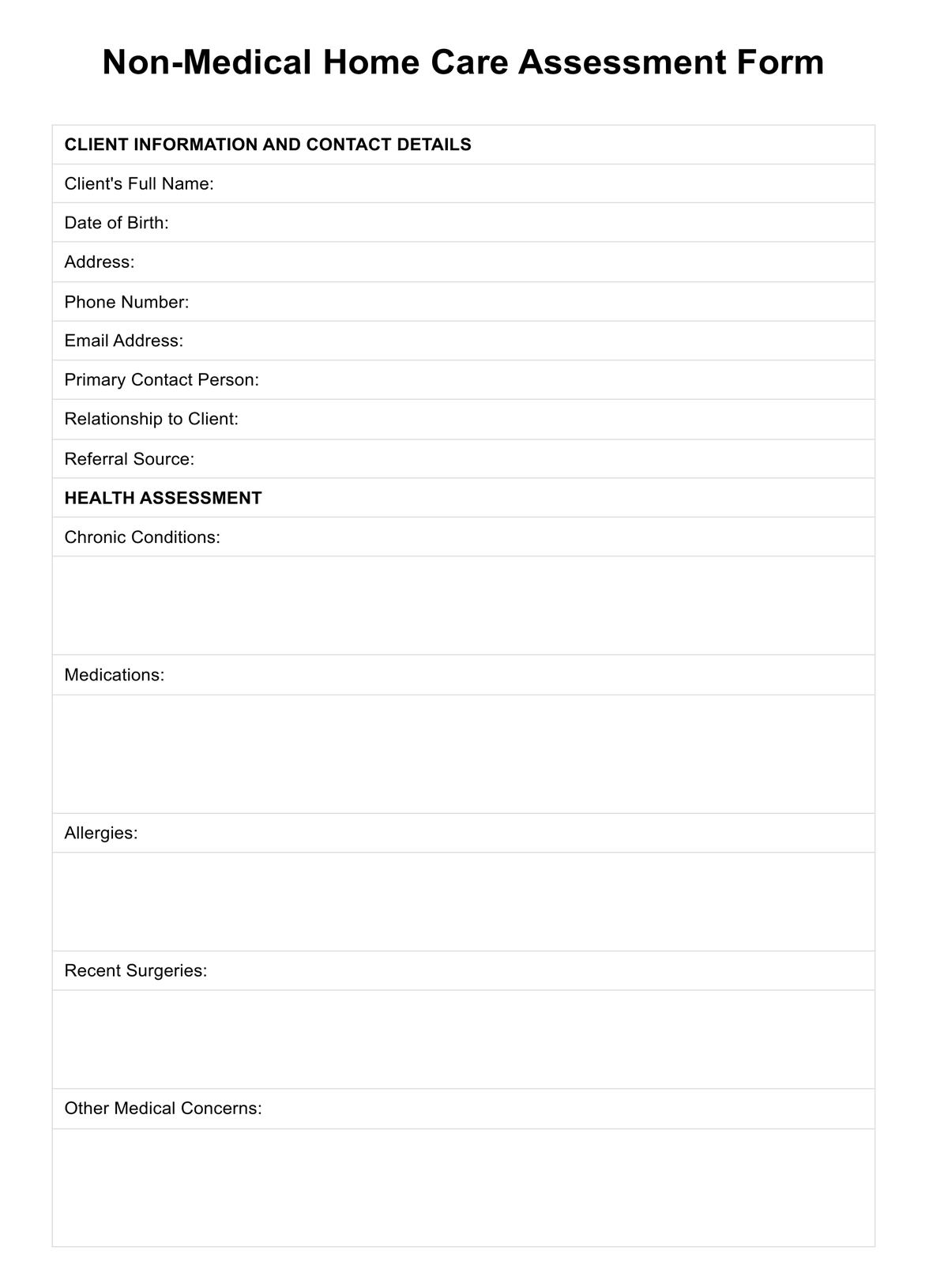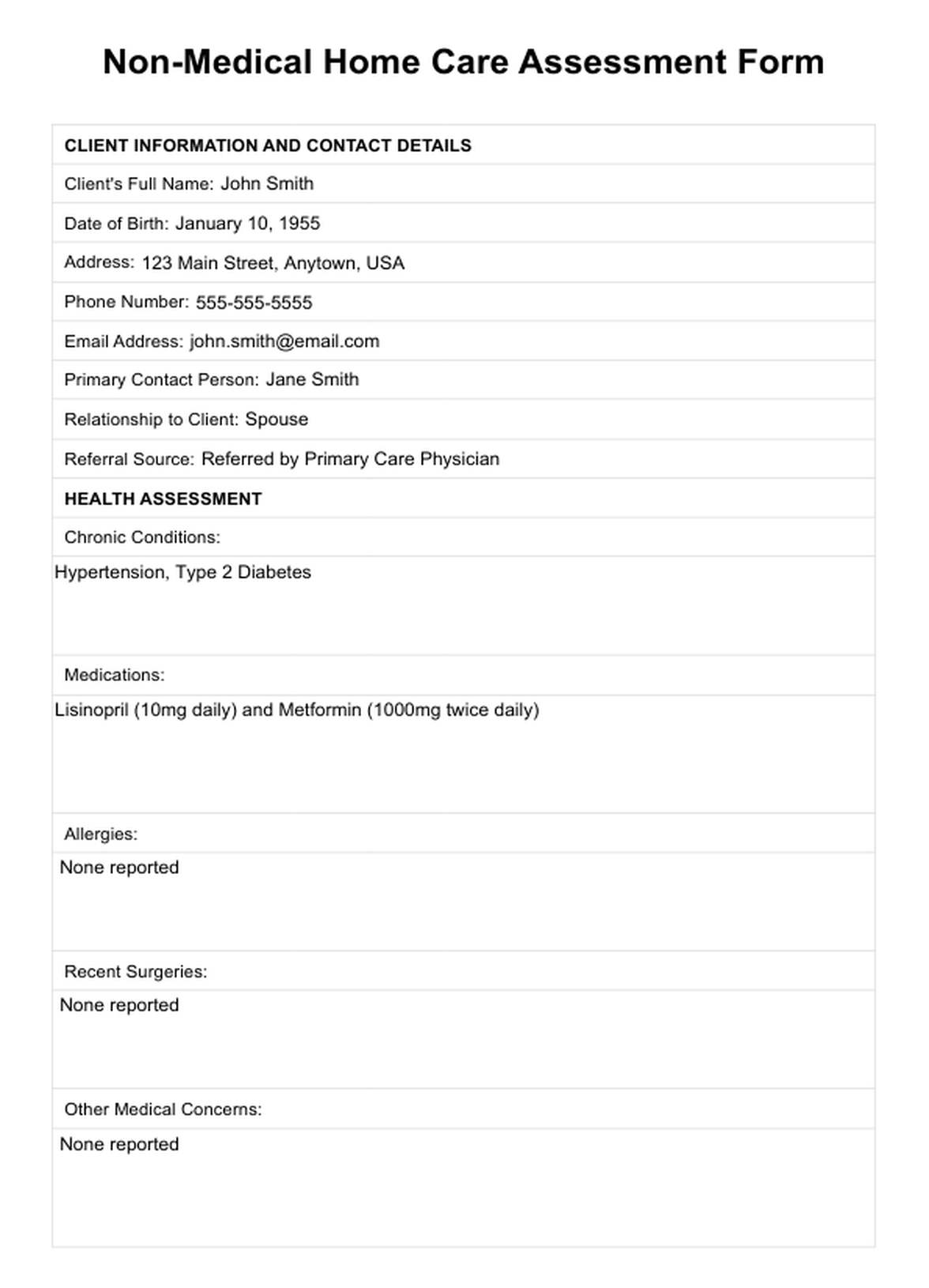Non-Medical Home Care Assessment Form PDF
Download, print, and fill out our Non-Medical Home Care Assessment Form PDF for thorough evaluation and personalized care plans. Streamline your caregiving process today!

By Joshua Napilay on Jul 15, 2024.
Fact Checked by RJ Gumban.


Table of content
What is non-medical home care?
Non-medical home care refers to a service provided to individuals, typically seniors or those with disabilities or chronic illnesses, who need assistance with daily activities but do not require medical care. This type of care is aimed at helping individuals maintain their independence and quality of life while remaining in their homes.
Non-medical home care services can include assistance with tasks such as:
- Personal care: Help with bathing, grooming, dressing, and toileting.
- Meal preparation: Planning and cooking nutritious meals according to dietary needs.
- Medication reminders: Assisting with medication management, including reminding individuals to take their medications as prescribed.
- Companionship: Providing social interaction, conversation, and emotional support.
- Light housekeeping: Performing cleaning tasks such as vacuuming, dusting, and laundry.
- Transportation: Assisting with transportation to appointments, grocery shopping, or other errands.
- Mobility assistance: Helping individuals move around the home safely, including walking or transferring from bed to chair.
Non-medical home care services are usually provided by trained caregivers or aides, who may be employed by home care agencies or hired directly by the individual or their family. These services promote independence, enhance quality of life, and provide peace of mind to individuals receiving care and their loved ones.
PDF Template
Example PDF
Non-Medical Home Care Assessment Form PDF Template

Non-Medical Home Care Assessment Form PDF Example

Who benefits from non-medical home care?
Several groups of people can benefit from non-medical home care services:
- Seniors: Older adults needing assistance with daily activities due to age-related issues such as mobility limitations, cognitive decline, or chronic health conditions can benefit from non-medical home care. These services help seniors maintain their independence and quality of life while aging in place.
- Individuals with disabilities: People with physical or cognitive disabilities may require support with tasks such as personal care, household chores, or transportation. Non-medical home care can provide the assistance they need to live comfortably and safely in their homes.
- Individuals recovering from illness or injury: After a hospital stay or surgery, individuals may need help with activities of daily living during their recovery period. Non-medical home care services can facilitate a smooth transition from hospital to home and help with rehabilitation efforts.
- Family caregivers: Family members who serve as primary caregivers for their loved ones may experience caregiver burnout or need respite care to take a break from their caregiving responsibilities. Non-medical home care can support family caregivers by offering assistance with caregiving tasks and allowing them time to rest and recharge.
- Individuals with chronic illnesses: People living with chronic conditions such as diabetes, heart disease, or arthritis may benefit from non-medical home care services to manage their symptoms, adhere to treatment plans, and maintain a healthy lifestyle.
Examples of non-medical home care services
Non-medical home care services encompass a wide range of assistance tailored to individuals who require support with daily activities but do not need medical care. Here are some examples of non-medical home care services:
- Personal care assistance: This includes help with activities such as bathing, grooming, dressing, and toileting. Caregivers assist individuals with maintaining personal hygiene and grooming routines.
- Medication reminders: Caregivers remind individuals to take their medications as their healthcare providers prescribe. They ensure that medications are taken on time and in the correct dosage.
- Light housekeeping: This includes tasks such as vacuuming, dusting, mopping, laundry, and changing bed linens. Caregivers help maintain a clean and comfortable living environment.
- Mobility assistance: Caregivers assist individuals with mobility issues by providing support with walking, transferring from bed to chair, or using mobility aids such as walkers or wheelchairs.
- Exercise and physical activity support: Caregivers can assist with exercises recommended by healthcare providers to promote mobility, strength, and flexibility.
- Fall prevention measures: Caregivers help identify and address potential fall hazards in the home environment and provide assistance to minimize the risk of falls.
- Respite care: This service offers temporary relief for family caregivers by providing trained caregivers to take over caregiving responsibilities for some time, allowing family caregivers to rest and recharge.
Components of Non-Medical Home Care Assessment Forms
Non-medical home care assessment forms are essential tools home care agencies and caregivers use to gather pertinent information about a client's needs, preferences, and living environment.
These forms and documents typically include several components to ensure a comprehensive assessment and personalized care planning. Here are the standard components found in non-medical home care assessment forms and documents:
Client information and contact details
This first document gathers basic demographic information about the client, including their name, date of birth, address, and contact details. It also includes other information, such as the primary contact person and how the client was referred to the home care agency.
- Client information: This section collects basic demographic details such as name, date of birth, address, contact information, emergency contacts, and any relevant medical history.
- Primary contact information: Information about the primary contact person, who may be a family member, legal guardian, or responsible party for the client.
- Referral source: Details about how the client was referred to the home care agency, including healthcare professionals, social workers, family members, or self-referral.
Health assessment
When assessing a client's health, we consider chronic conditions, allergies, medications, and recent surgeries. This helps us understand their current health status and specific medical needs. We provide a comprehensive overview of their health status, including any disabilities, ongoing treatments, or therapies.
Functional assessment
This category assesses the client's ability to perform activities of daily living (ADLs) and instrumental activities of daily living (IADLs) and identify safety hazards within their home environment. It helps determine the level of assistance and support required for everyday tasks.
- Functional assessment: This component evaluates the client's ability to perform activities of daily living (ADLs) and instrumental activities of daily living (IADLs), such as bathing, dressing, toileting, mobility, meal preparation, housekeeping, managing finances, and transportation.
- Safety assessment: Identify potential safety hazards within the client's home environment, including fall risks, fire hazards, accessibility issues, and the need for adaptive equipment or modifications.
- Nutritional assessment: Evaluation of the client's dietary needs, food preferences, meal preparation abilities, hydration status, and any special dietary requirements or restrictions.
Social and emotional assessment
Here, the organization evaluates the client's social support network, emotional well-being, and any signs of depression or anxiety. Additionally, it assesses the support needs of informal caregivers to ensure the client's holistic well-being.
- Social and emotional assessment: Assessment of the client's social support network, cognitive function, emotional well-being, and any signs of depression, anxiety, or social isolation.
- Caregiver support needs: Identification of the availability and capabilities of informal caregivers (family members, friends) and assessment of their support needs and potential caregiver burden.
Personalization and preferences
This involves gathering detailed information about the client's preferences, routines, cultural background, and goals for care. It aims to tailor the care plan to meet the client's needs and preferences.
- Preferences and personalization: Gathering information about the client's preferences, routines, cultural background, religious beliefs, hobbies, interests, and any specific requests regarding care provision.
- Goals and Expectations: Collaboratively set goals with the client and family members, identify expectations for the home care services, and outline the desired care outcomes.
Emergency preparedness and authorization
Emergency protocols and procedures are documented in each organization in this category, and consent for services and information sharing is obtained. This ensures that the necessary measures are in place to respond effectively to medical emergencies and that all parties know their rights and responsibilities.
- Emergency preparedness: Documenting emergency protocols, including contact information for healthcare providers, emergency services, and procedures to follow in case of medical emergencies or natural disasters.
- Consent and authorization: Obtaining consent for services and authorization to share information with relevant parties involved in the client's care, ensuring compliance with privacy regulations.
Finalization
This procedure includes getting signatures from the client or their legal representative. The signature confirms that the client agrees with the information provided in the assessment form. This procedure also verifies that the assessment process is complete. The client, family members, or legal representatives can sign the form to indicate their acknowledgment and agreement with the information provided.
Advantages of using the PDF assessment form
- Versatility: The PDF format allows users to access the assessment form from various devices, ensuring flexibility and convenience.
- Efficiency: Step-by-step instructions streamline the assessment process, saving time and reducing errors.
- Security: Robust security measures protect client data, ensuring confidentiality and compliance with privacy laws.
- Accessibility: Online access enables users to complete assessments remotely, enhancing accessibility for clients and caregivers.
- Mission alignment: By utilizing efficient assessment procedures, caregivers can better align with the company's mission of providing quality non-medical home care solutions tailored to each client's needs.






